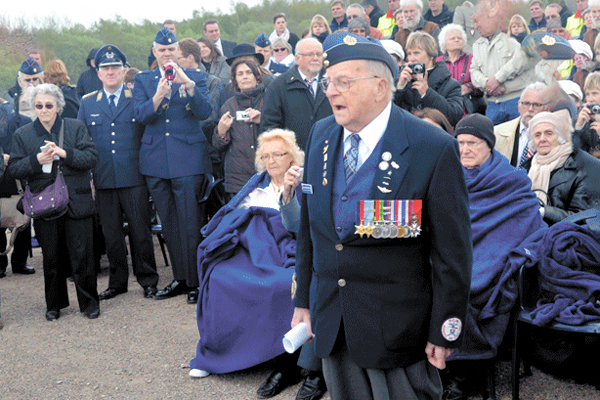RCAF airman who survived a Nazi death camp passes away
By Lookout on Mar 10, 2017 with Comments 0

Edward Carter-Edwards sings “We’ll Meet Again” during a visit to Buchenwald concentration camp in 2014. Photo by Lieutenant-Colonel (Retired) Dean Black, Royal Canadian Air Force Association
Joanna Calder, Air Forces PA ~
Edward Carter-Edwards, who survived the notorious Nazi death camp Buchenwald, died Feb. 22, in Smithville, ON. His funeral was held on Monday, Feb. 27. He was 94.
Sergeant Carter-Edwards was a wireless air gunner on a Halifax Mark III bomber when it was shot down over occupied France in 1944. He made his way to Paris, but was picked up by the Germans, imprisoned, and eventually shipped by cattle car to Buchenwald: five long days under brutal conditions.
He and other airmen should have been sent to a prisoner of war camp but his captors refused to believe that he was an Allied airman and instead accused him of being a spy and saboteur.
“The thing that frightened us the most was this tall chimney with smoke belching out of it. And the only way to get out of Buchenwald was through the chimney,” he said in a video posted on the “Lost Airmen of Buchenwald” Facebook page, as he described his arrival at Buchenwald.
Sergeant Carter-Edwards was one of 168 airmen—including 26 Canadians—wrongfully imprisoned in the concentration camp. While there, he fell sick with pneumonia and pleurisy, which ordinarily would have been a death sentence as there was no medical treatment for those who were sick; the prisoners got better or they died. In fact, anyone who was considered too sick was hastened to his end with a fatal injection.
According to Nathan M. Greenfield in his book The Forgotten: Canadian POWs, Escapers and Evaders in Europe 1939-1945, one of the reasons Sergeant Carter-Edwards survived was that “at night the orderlies ‘submerged’ the Canadian delirious with fever; that is, they moved him bed to bed so that the Doktor would not recall him from the day before and order his death.”
In addition, a French doctor, who was also a prisoner, used a syringe to extract fluid from Sergeant Carter-Edwards’ lungs.
Eventually, Sergeant Carter-Edwards and all but two of the Allied airmen were transferred out of Buchenwald to Stalag Luft III prisoner of war camp on Nov. 28, 1944, through the intervention of members of the Luftwaffe.
“Somehow, the German Air Force—who was our enemy in combat but strictly comrade-in-arms—found out there was 166 allied airmen in Buchenwald,” he recounted in a video posted on the Veterans Affairs Canada website. “Our enemy, who was German Air Force and maybe even shot some of us down, saved our lives, saved their lives . . . they found out after they got out that five days later we would all have been hung on the meat hooks below the crematorium by stringing piano wire around our necks and hanging them on these meat hooks. We would have all been strangled to death. That was the orders that came down from Buchenwald.”
For many years, Carter-Edwards didn’t speak of his experience because, simply put, no-one believed him. But in 1988 the International Red Cross confirmed, from its investigation of German records, that he had been committed to Buchenwald by the SS, treated several times in the infirmary, and transferred to Stalag Luft III. In his later years, Edward Carter-Edwards became a tireless speaker about his war experiences and the dangers of intolerance.
At the end of his talks and speeches, Edward Carter-Edwards would often sing Vera Lynn’s beautiful song, “We’ll Meet Again”:
We’ll meet again
Don’t know where,
don’t know when.
But I know we’ll meet again.
Some sunny day.
Filed Under: Top Stories
About the Author:





